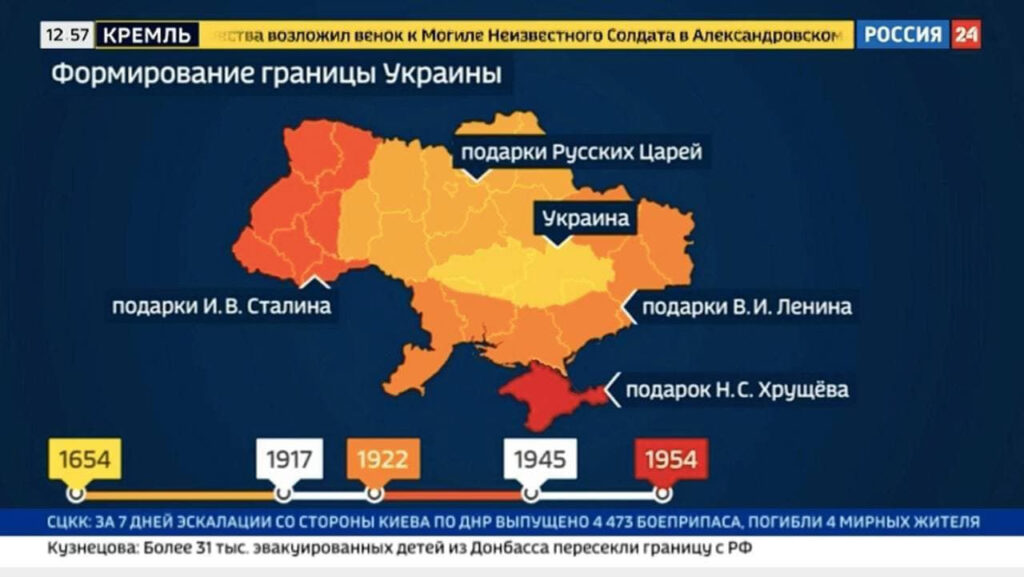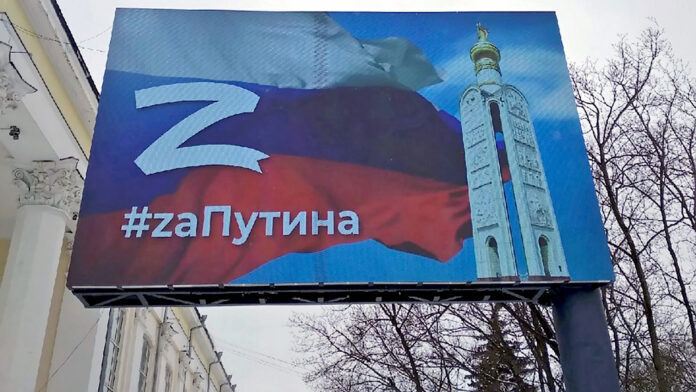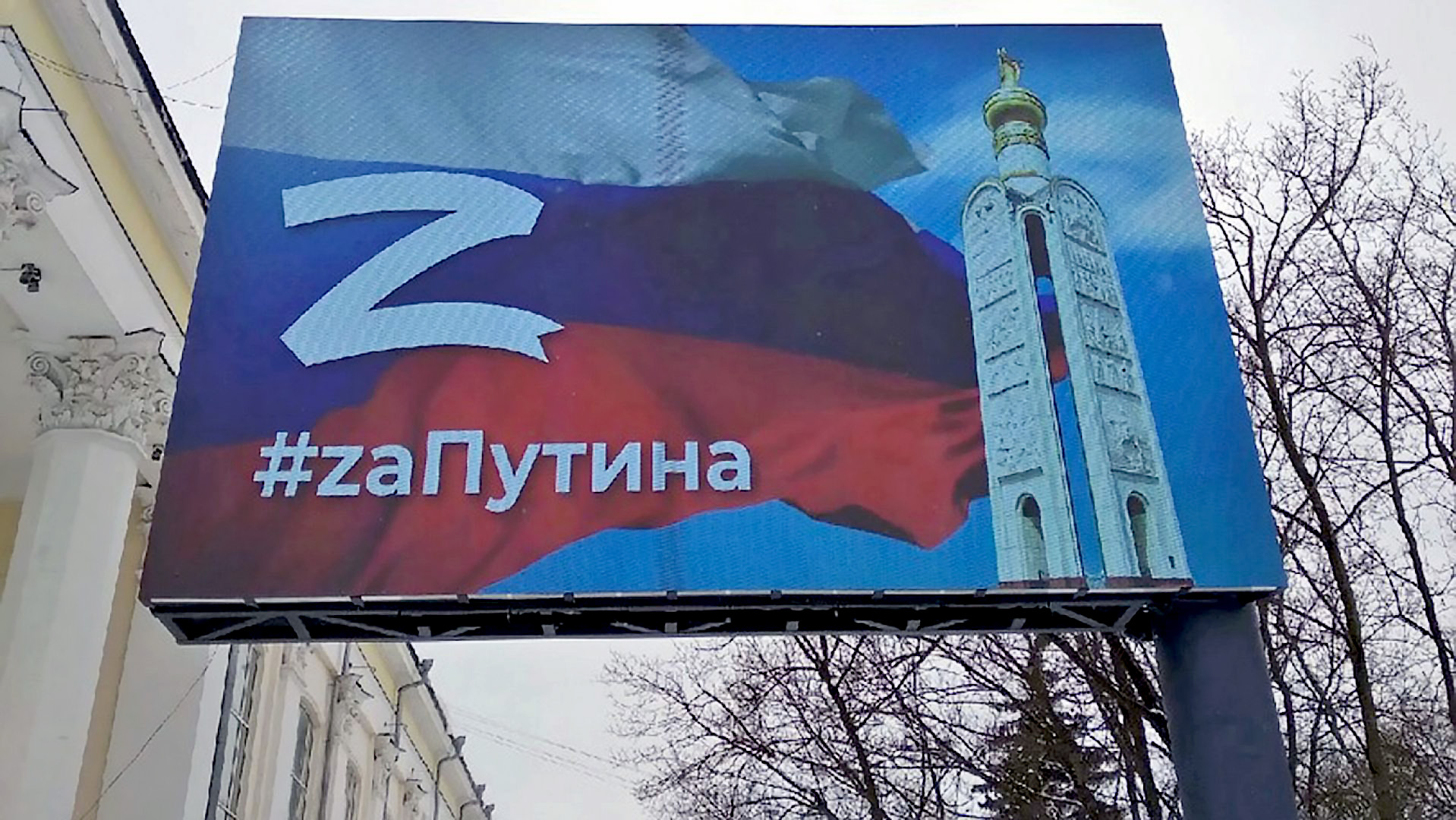How do experts, close to the Kremlin or not, represent the post-war world? Here is what we can glean from the tightly controlled Russian media. The surrealistic projects spawned by the geopolitical dreams of the last few years cannot ward off the foreboding of impending disaster, and the desire to desperately cling to an idealized past.
Ukraine
“The military operation will end soon. And peace in Ukraine will eventually come. But it will be peace on our terms,” writes the journalist Igor Moiseyev. Vladimir Putin’s statements seem to indicate that Russia intends to put off plans for the division of Ukraine and move towards control over the entire Ukrainian territory transformed into a Russian province: “The current leaders in Kiev must understand that if they continue, the existence of the Ukrainian state will be called into question,” Vladimir Putin threatened on March 5, 2022. According to journalist Timur Cherzad, Russia is conducting a “chivalrous war” in Ukraine, trying to “separate nationalists in small towns from Ukrainian society (denazification), so that Ukrainians can again merge with Russians, increasing both the demographic and geographical base of the Russian people.”
It is clear, however, from the convergent statements relayed in a press now tightly controlled by the Kremlin that the first stage planned by Russia is a purge, even a large-scale extermination of the Ukrainian people. The Duma deputy Andrei Kolesnik, a former Spetznaz, unearths the sinister formula of the Stalinist era: “If the enemy does not surrender, he must be annihilated. Russia has no right to turn back, nor even to stop halfway. Ukraine must be demilitarized and the Ukrainian Nazis must be destroyed.”
Let’s listen carefully to the recommendations of the orientalist Aleksandr Saveliev, and of the blogger Lev Verchilin: “Does Russia need Kiev and other major Ukrainian cities, where Russophobia has been cultivated for decades? Is it possible to restore a country friendly to Russia in a historically short time? Russian leaders should not fool themselves about this — dens of banderovtsy [followers of Stepan Bandera (1909-1959), leader of the Organization of Ukrainian Nationalists, Editor’s note] exist today not only in the basements of Western Ukrainians, but also in the minds of the younger generation. The children who were demonstrating on the Maidan in 2004 have long been fathers and mothers themselves and are raising their children according to their own, largely racist, ideas. Russia has delayed too long, […] so that the security problems can now no longer be solved easily and without bloodshed.” Elena Karaieva, a journalist with the official RIA Novosti agency, hammers home, “We are going to carry out a definitive curettage of this [Ukrainian] belly, which, as we have seen, has still shown itself capable of ‘carrying a reptile’ after the first curettage [in 2014].”
Next step, the model of the Soviet occupation zone in Germany (1945-1949: the future GDR) will be implemented, as announced by Igor Moiseyev: “Under no circumstances should a humanitarian catastrophe be tolerated on the liberated territory, which is what the West is counting on. Each municipality must have an administrator with full powers, who has the support of the army and the right to use this military force if necessary. If necessary, military commanders will be sent to the regions, as was done in the past in liberated Germany, with military units assigned to them.” If this East German model is applied, three administrations will be in charge of controlling the Ukraine: the army, the secret services, and, above all, a propaganda department: “Well-conceived propaganda within the German population has formed a guilt complex among the Germans for the crimes of the Nazis which exists still today. The same propaganda must be carried out in Ukraine and pursued relentlessly,” recommends Sergei Kozlov, a veteran of the Spetznaz.
Since March 6, the Russians have realized that they cannot ensure the domination of Ukraine by military means alone. The invader’s objective is now to try to split the Ukrainian population from its army, claiming that the lives of civilians do not count for the Ukrainian military, while the Russians are multiplying the humanitarian aid points and offering evacuation corridors blocked by the Ukrainian army. Moscow is mounting a large-scale psychological war in Ukraine, which must be taken seriously. Let us remember the way Russia absorbed Poland, magnificently described by Michelet: “Russia is persistently striving to create a Poland against Poland, like a perfidious doctor who, taking on the task of curing a sick person in spite of himself, will skilfully choose to arouse other living bodies in this living body, to infest it with worms […] It is not the sword of the Russians that has defeated Poland; it is their language that has brought about the dissolution.” 1

The upheaval of the international scene
Naryshkin, the head of the SVR, set the tone for the Kremlin’s propaganda discourse for the days ahead in a statement on March 3, 2022. According to him, a fundamentally new stage in European and world history has just begun, characterized by “the collapse of the unipolar world and the system of international relations based on the right of the strongest, i.e. the United States, to destroy other states in order to prevent the slightest possibility of their transformation into alternative centers of power… Today, Russia is throwing down an open challenge to this system — creating a truly multipolar world, which has never existed before and from which everyone will benefit in the future.” The current conflict in Ukraine offers “a good opportunity for a thorough revision of international legal regimes and obligations, for developing fundamentally new ways of dealing with the West and the world.”
Russian commentators are harping on the theme of “the weakening hegemony of the United States”. Leading the way is the indefatigable Piotr Akopov of RIA: “The Atlantic world order, or rather what is left of it, will collapse even faster. The West […] has retreated. […] The Anglo-Saxons are leaving the Middle East. In the medium term, they will not be able to contain China in the Pacific region. They are being ousted in Latin America and are giving in to competition in Africa. The Iron Curtain is not coming down in front of Russia, despite the extent of the hardships inflicted on our economy. Geopolitical isolation threatens the West.”
Political scientist Vladimir Mozhegov, not to be outdone, declares: “What will happen tomorrow? But it is probably better to start with what will disappear. Many people, including our Western partners, still find it difficult to understand that the old world no longer exists. Neither the old diplomacy (it is long gone, they just forgot to tell us); nor the old political structures and alliances (including NATO itself, which is already unraveling). Finally, the old unipolar world will disappear. […] Have you noticed that our president always does exactly what he says?… Believe me, the demand to bring NATO back to the 1991 borders is not a joke, it is serious. The question is: how to achieve this? The old rules are gone, the Yalta peace is gone, the international security system is gone. The new world is made by the bold.”
Many analysts are aware that Europe is lost for good. For some, Europe is even in the process of dethroning the United States as enemy number one. Political scientist Timofei Bordachev, director of programs at the Valdai Club, wrote on March 2, 2022: “Europe is now Russia’s main adversary […] Europe is rushing into the abyss, led by a distraught Germany, shocked by its inability to ‘impose peace on Russia’. German politicians and society are reacting to this shock in the same way they did in the first half of the 20th century — with maximum aggression against the one who brought them out of a state of sanity. The Americans, who are pulling the strings from behind the scenes, are standing aside for now. They are Russia’s main adversaries; they are fighting for its weakening or maximum neutralization. Thanks to their geographical position, they can now, as in the two world wars, manipulate the others from afar. The greatest achievement of the United States at the moment is that there is no direct conflict with Russia, there are still very few American troops in Europe, and we see no signs that the United States will seriously intervene in the conflict. This is, of course, good from the point of view of the likelihood of a dangerous escalation for the fate of all mankind, but it contributes to prolonging the confrontation, which will become chronic in the relations between Russia and the rest of Europe.”
The belief that the major European countries are lost (at least in the immediate future) is leading Kremlin’s strategists to rethink their policy from top to bottom. Some believe that something can still be saved. Vladimir Mojegov (March 3, 2022) dreams of the construction of a central European bloc under Russian influence, which could be cemented if Russia were to satisfy the revisionist demands of some at the expense of Ukraine: “Today, Hungary and (less openly, but really) Austria sympathize with us. In the new world, they could very soon be in our orbit. And Orban is already gathering troops on the border of western Ukraine, where the Hungarians live, whom the western Ukrainian nationalists oppress in the same way as they oppress the Russians, forbidding their native language. Hungary wants to take back its land from a country that no longer exists and bring back its language. Moreover, it seems that Hungary is not opposed to the idea of leaving the European Union. […] Germany and France refuse to vote for sanctions that are too severe, knowing fully well where this could lead. By the way, in addition to Hungary, Romania, Slovakia and Poland also have territorial claims on western Ukraine. It is necessary to come to an agreement with all these countries on good neighbourliness, on friendship, on neutrality, on the rejection of military bases — addressing each of them carefully and in an appropriate manner. Issues affecting difficult countries as important as Ukraine or Poland can only be solved by large alliances. Like the good neighborly agreement between Russia and Germany. Or — since Germany is still a country shackled hand and foot by an evil wizard — between Russia and Austria (which, by the way, is not a member of NATO). Let’s not forget: Austria and Hungary (as well as Croatia, part of Romania, Slovakia, Slovenia, the Czech Republic) were once a powerful Austro-Hungarian empire, very similar to Russia’s and very close to us. As for the other Eastern European countries, only the complete lack of alternatives continues to keep them in the current Atlantic influence zone. Slovenia, Croatia, Montenegro, not to mention Orthodox Serbia, Bulgaria, Greece, will be the first to leave both the EU and NATO, if they have a choice, when the old structures start to disintegrate. And this is our vision of the future: NATO withdraws, evacuates the bases in the Baltic and Poland, and Germany becomes what we had planned for it in 1989: united, free, neutral. Today, our main task is to rewind the disastrous developments that have brought us to where we are, and to return to the situation of 1991, tomorrow to that of 1989 (a united neutral Germany), and then, perhaps, we will go further — back to 1913, and even further — to the Great Concert of Free European Powers.”
Moscow is eagerly watching for signs of the decline of American influence in the world, taking stock of the countries that have not joined the sanctions. This is the case of Latin American countries: “Latin America has left the geopolitical tutelage of the United States and now leads an independent life, a life where national interests come first. Having pushed almost all of Europe into a confrontation with Moscow, the Americans have lost the neighboring continent. […] There is no longer a unipolar world, not even a unipolar America.”
However, triumphalism appears somehow muted at times. Timofei Bordachev reminds us that countries will not oppose their interests if relations with Russia might cost them other markets. It is worth noting how discrete China has been, making it clear that it will not sacrifice its relations with the West for Russia: “We must not forget that demanding the sacrifice of our friends and partners is a short-sighted and foolish strategy — they do not have the right to act at the expense of their fellow citizens. Therefore, despite allied relations with Russia, Beijing will not be able to force its companies and banks to do something that will harm them. […] The same is true, for example, of India. India has taken a more reticent stance than China in the conflict between Russia and the West, but neither is it participating in Western sanctions. However, this does not mean that Indian companies will engage in self-destructive actions. […] The other two BRICS countries — Brazil and South Africa, as well as the large emerging economies — Pakistan, Indonesia, Argentina and others will take a similar position. Russia will be able to create many opportunities for itself, except for one, which is to try to live off one of these countries as it has done in the last 30 years with Europe, when it settled into almost total dependence, not on its own work and skills, but on privileges received from an external partner. Russia will have to take into account the interests of these partners and seek their cooperation in what is really important […] Interesting examples in this sense are given by small countries geographically close to us, like Georgia, Serbia or Moldova. Unlike most EU countries, they do not have aggressive intentions towards Russia and do not depend on bloc discipline. As a result, each of them focuses on their own interests — political or economic.”
A turn to Asia?
The break with Europe returns on the agenda a pet project of the conservative fundamentalists gravitating around the Kremlin, who feel the wind in their sails. The idea is to turn one’s back on decadent Europe and to turn Russia towards Asia while encouraging autarkic development. In 2021, the Minister of Defense Sergei Shoigu had already proposed to move the capital to Siberia and to build there five large industrial and scientific centers. Timofei Bordachev has called the current crisis in relations with the West a “unique opportunity” to turn to Asia while continuing to focus on internal development. Oligarch Oleg Deripaska joined the chorus, proposing to move the Russian capital to Siberia and to focus on relations with Asia: “I always say: why do we need a capital in Moscow, if we have all our interests in Asia? And the missiles will take longer to reach it, and everything else will be different if the capital is located in Novosibirsk, Krasnoyarsk”. LDPR [Zhirinovsky’s party] Duma deputy Alexei Didenko agrees: “History itself is pushing us eastward, but we insist on going westward. But we are Papuans for them, […] We must realize that we will never be considered as Europeans and must declare that the East is our new vector of socio-economic development. There is no more Europe after they [the Europeans] themselves have fanned the flames in Ukraine.” Political scientist Konstantin Kalachev believes that “there is simply no other way out. I agree with Oleg Deripaska on almost everything, both on the prediction of a serious crisis in the next three years and on the fact that we should forget about the European markets. In such a situation, only Asia is a lifeline for Russia.”
Western sanctions: between rhetoric and panic
Russia is aware that the sanctions regime is serious and will last for a long time. Lavrov, who sees it as “a tax on our sovereignty”, is puffing up his chest: “If the West decides to do so, then I assure you that we will find a way to continue to live, to develop, and we will not even worry too much about the decisions taken by our Western partners…”. Vladimir Mojegov rubs his hands together: “Ah yes, the sanctions!… All that remains is to nationalize our supercorporations, and the conservative revolution can be considered complete. We seem to be quite ready for that.”
Revealingly, nationalist journalist Mikhail Demurin shows the link between the war of expansion and the autarkic ambition that has been brewing for years among the ideologues close to the Kremlin: “The military operation that our country is conducting against the fascist regime that took over Kiev in 2014 is increasingly taking on the character of a political operation of internal cleansing. It is bursting one by one the abscesses that formed on Russia’s body thanks to the efforts of the West in the 1990s and were not cleaned up in the 2000s.” The planned de-Europeanization in Ukraine parallels that already taking place in Russia.
Those who have not been intoxicated by patriotic fumes, serious economists like Natalia Zubarevich, announce a less cheerful future: “We will return to the diet of a simple Soviet family — potatoes, salted cabbage and sausage”. These economists have the courage to contradict the official thesis which explains the sanctions by the eternal will of the West to destroy Russia. For Natalia Zubarevich “There is a collective responsibility. Because the country elected a leader who made this choice.” Political scientist Kiril Rogov points out that “one would look in vain for another leader capable of bringing to his country the damage that Putin has managed to inflict in such a short time to the Russian economy (which was going rather well)”. Russia returns to war communism. Except that, as for Covid, the Russian state has no intention of taking its responsibilities: Putin has just announced that entrepreneurs must be given maximum freedom. He is already preparing to pass the buck to ready-made scapegoats.
Experts predict a restructuring of global economic relations in the coming years, that will take place around Russia and without its participation. Russia is in danger of losing its entire economic and social infrastructure. On average, all imported goods have already increased in price by about 30%. Interest rates are now over 20%. The construction sector is already in a dismal state. In the health sector the consequences of the sanctions and the devaluation of the ruble will be catastrophic, because the Russian pharmaceutical industry is underdeveloped. Since March 6, Russians have experienced rationing in the stores. Moreover, the exodus of workers is already noticeable in Russia. The wages of migrants have already been cut in half due to inflation. In response to Western sanctions, Vladimir Putin has decided to set a ceiling on how much currency that can be transferred abroad. This means that Russian residents will not be able to transfer funds to accounts in foreign banks. For migrants from Central Asian countries, it has become difficult to convert their Russian income into dollars and national currency. Now it is the Russians who will look for work in Kazakhstan! According to the economist Andrei Nechaev, the regions of the Far East are likely to become inaccessible because of the collapse of air transport due to Western sanctions.
The fallout
Moscow’s position in the Eurasian Union and the CSTO is weakening. Kazakhstan has refused to send troops to Ukraine. The sanctions imposed on Russia will call into question major mixed economic projects. None of these countries want to be subjected to Western sanctions. Tajikistan and Kyrgyzstan are the most vulnerable; their economy depends on money transfers from migrants working in Russia. According to Andrei Serenko, an expert at the Centre for the Study of Modern Afghanistan, in recent days some Taliban commanders in the Afghan province of Badakhshan have been discussing the possibility of invading neighbouring Tajikistan. They expect conditions to be favorable if the Russian special military operation in Ukraine fails. “Taliban commanders are convinced that the failure of the Russian operation in Ukraine will not only demoralize Moscow, but also make it unlikely to intervene in new armed conflicts that may break out in other parts of the post-Soviet space. In other words, the Taliban believe that in the event of an invasion of Tajikistan by a large group of fighters, it is unlikely that Russia will be able to provide significant support to Dushanbe.”
Those Russians who remain clear-eyed consider two scenarios for the future. Either a palace revolution initiated by the elites, who have begun to detach themselves from Putin since 2008, and in 2011 they wanted Medvedev to serve a second term. Historian Andrei Zubov ascribes to this scenario: Putin “will be removed in the next few days. A new leader, not Putin, will have to return their ‘good life’ to the bosses of the regime, restore relations with the West, obtain the release of accounts in foreign banks, and the lifting of the sequestration on their property. It will have to be a personality not tainted by the current crimes, better yet, someone who has loudly condemned them, but who comes from their milieu, someone with whom we can agree.”
Others, more pessimistic, like the writer Vladimir Sorokin, are convinced that the regime will continue its regressive trajectory: “Like a large iceberg, the country has floated through the Soviet past, and continues its course towards the medieval past.” Russia is reportedly headed for the end of politics, as a Nezavisimaya Gazeta editorial of February 27, 2022, suggests: “The rapid collapse of Russia’s international financial and economic status as a result of unprecedented sanctions has more than likely not yet been adequately assessed. Russians will experience a sharp drop in their standard of living. The government will stop worrying about its popularity, arguing that the West is threatening Russia’s very existence. Talking about politics will no longer make sense: “After all, politics is an attribute and a sign of peacetime.”
For his part, independent political scientist Kirill Rogov envisions a scenario in which Russian troops withdraw from Ukrainian territory, at the same time what Russian television boasts about “the restoration of the expanded Donbass” and trumpets that “the children of Donetsk can sleep easy.” In this scenario, Putin does not lose power, and Russia is transformed into a kind of “Irano-Turkmenistan: a poor, repressive autarky fenced in by an iron curtain.”
Struck by a fatal wound, the regime continues to function as usual, maintaining its momentum, reinforcing the repression and increasing the decibels of propaganda. Clear-sighted Russians are expressing this in their own way. For the blogger Alexander Nevzorov, “Putin’s regime now looks like a decapitated chicken that continues to run and wants to peck”. Opposition journalist Igor Yakovenko writes with melancholy: “We live by inertia, without noticing that the country is already dead. I say words in Russian and they die as soon as they leave my mouth”.
She has a degree in classical literature and spent 4 years in the USSR from 1973 to 1978. She is an agrégée in Russian and teaches Soviet history and international relations at Paris Sorbonne.
Books
- Beria, le Janus du Kremlin (Editions du Cerf, 2013)
- Comprendre le poutinisme (Desclée de Brouwer, 2018)
- La Marche à rebours (Sorbonne Université Presses, 2021)




